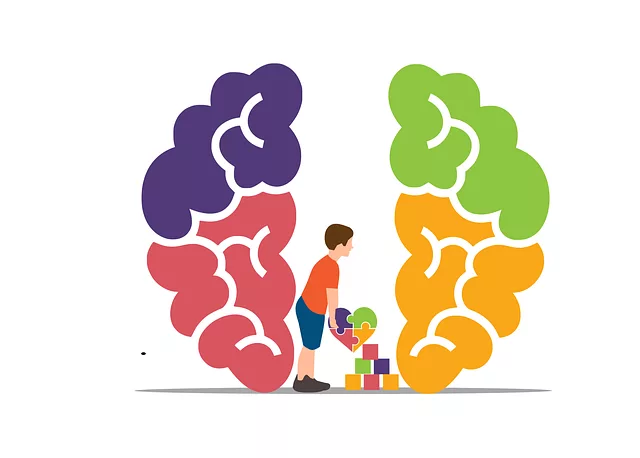Risk assessment is vital for harm minimization in mental health, identifying issues like stress or low self-esteem before they escalate into conditions like depression or anxiety. Kaiser Broomfield's services use rigorous protocols considering individual and systemic factors to assess risk, developing tailored interventions including awareness campaigns and therapeutic sessions. This multi-faceted approach prioritizes patient safety and recovery support, with regular reviews ensuring plans remain effective and accessible. Understanding how to access mental health services through Kaiser Broomfield involves a comprehensive harm minimization plan focusing on risk assessment, self-care promotion, and evidence-based interventions. Collaborative efforts between patients, healthcare providers, and support systems, aligned with Mind Over Matter principles, are key. Regular reviews, open communication, and patient participation ensure tailored interventions based on evolving needs, facilitating improved mental health and well-being. Organizations like Kaiser Broomfield drive progress through dynamic risk assessment strategies, integrating best practices and research to foster resilience among patients and providers, enhancing outcomes and building community trust in accessing mental health services.
Risk assessment and harm minimization planning are vital components in ensuring the safety and well-being of individuals seeking mental health services. This comprehensive guide explores how organizations like Kaiser Broomfield can navigate these processes effectively. We delve into understanding risk assessment as a foundational step for harm minimization, identifying potential risks specific to mental health services, and developing robust strategies. By implementing and regularly reviewing these plans, healthcare providers can enhance service delivery, fostering a safer environment for all patients.
- Understanding Risk Assessment: A Foundation for Harm Minimization
- Identifying Potential Risks in Mental Health Services: Kaiser Broomfield Context
- Developing a Comprehensive Harm Minimization Plan
- Implementing and Monitoring the Plan: Strategies for Success
- Continuous Improvement: Regular Review and Update Processes
Understanding Risk Assessment: A Foundation for Harm Minimization

Risk assessment is a fundamental process in harm minimization planning, especially when addressing mental health concerns. It involves meticulously evaluating potential hazards and their likelihood to cause harm, focusing on both external factors and internal capabilities for intervention. By understanding the risks, such as high-stress levels or low self-esteem, which might escalate into more severe issues like depression or anxiety, individuals and organizations can proactively develop strategies to mitigate these dangers.
For those seeking mental health support through Kaiser Broomfield, this process is crucial. It enables service providers to tailor interventions that cater to individual needs. By gauging the risks, they can design programs, from public awareness campaigns on stress reduction methods to therapeutic sessions aimed at self-esteem improvement, ensuring effective harm minimization and promoting better mental well-being within the community.
Identifying Potential Risks in Mental Health Services: Kaiser Broomfield Context

Mental health services, much like any other sector, come with their own unique set of risks and challenges. When it comes to organizations like Kaiser Broomfield, understanding and mitigating these risks is key to providing effective care. One of the primary areas of concern is ensuring patient safety while fostering a supportive environment for recovery.
To effectively navigate this, Kaiser Broomfield employs a multi-faceted approach. This includes rigorous risk assessment protocols that consider both individual patient needs and broader systemic factors. By integrating strategies like Inner Strength Development, Social Skills Training, and Depression Prevention, they aim to preempt potential issues. Regular reviews and updates to these plans are essential, especially as the mental health landscape evolves, ensuring how to get mental health services through Kaiser Broomfield remains accessible and tailored to each individual’s needs.
Developing a Comprehensive Harm Minimization Plan

Developing a comprehensive harm minimization plan involves several key steps. The first step is to conduct a thorough risk assessment, identifying potential hazards and their likelihood and impact. This process requires a deep understanding of the environment, activities, and populations involved, including accessing mental health services through Kaiser Broomfield for at-risk individuals. Incorporating self-care practices and promoting mental health awareness among stakeholders is crucial in this phase.
Once risks are identified, a strategic plan should be devised to mitigate them. This includes implementing evidence-based interventions, developing policies that support mental health advocacy, and fostering an environment that encourages open dialogue about mental health issues. Regular review and updates of the harm minimization plan are essential to ensure its effectiveness, especially in light of evolving best practices and changing community needs, such as those highlighted in a recent mental health policy analysis.
Implementing and Monitoring the Plan: Strategies for Success

Implementing and monitoring a harm minimization plan is paramount to ensure its effectiveness in mitigating risks and promoting well-being. At Kaiser Broomfield, individuals seeking mental health services can benefit from collaborative efforts between patients, healthcare providers, and support systems. A successful strategy involves regular review and adjustment of the plan, aligning with Mind Over Matter Principles. This process requires open communication, where patients actively participate in identifying triggers, setting personal goals, and exploring self-care practices to enhance their mental resilience.
By integrating Self-Care Practices into daily routines, individuals can foster self-esteem improvement and better manage stressors. Regular check-ins with healthcare providers allow for progress assessments and necessary adjustments to the harm minimization plan. This continuous monitoring ensures that interventions remain relevant and tailored to the individual’s evolving needs, ultimately facilitating a more successful journey towards improved mental health and well-being.
Continuous Improvement: Regular Review and Update Processes

In the ever-evolving landscape of mental healthcare, continuous improvement is paramount. Organizations like Kaiser Broomfield play a vital role in enhancing access to services through regular review and update processes. By systematically evaluating existing harm minimization plans and risk assessment strategies, they ensure that their practices align with current best practices and emerging research in mental health. This commitment to ongoing refinement fosters resilience building among both patients and healthcare providers, allowing for more effective support tailored to diverse needs.
Moreover, cultural sensitivity in mental healthcare practice is a key aspect integrated into these reviews. Healthcare provider cultural competency training equips staff with the knowledge and skills to offer culturally responsive care, addressing barriers that might prevent individuals from receiving the mental health services they deserve. Such proactive measures not only improve patient outcomes but also strengthen community trust and engagement, ensuring that mental health resources are accessible and inclusive for all, including those seeking services through Kaiser Broomfield.
Risk assessment and harm minimization planning are essential components in ensuring the safety and well-being of individuals seeking mental health services. By understanding the potential risks, such as those identified in the Kaiser Broomfield context, healthcare providers can develop comprehensive strategies to mitigate these issues. Following a structured approach, including regular reviews and updates, allows for continuous improvement in service delivery. For those looking to access mental health support through Kaiser Broomfield, implementing these practices ensures a more secure and effective care journey.






